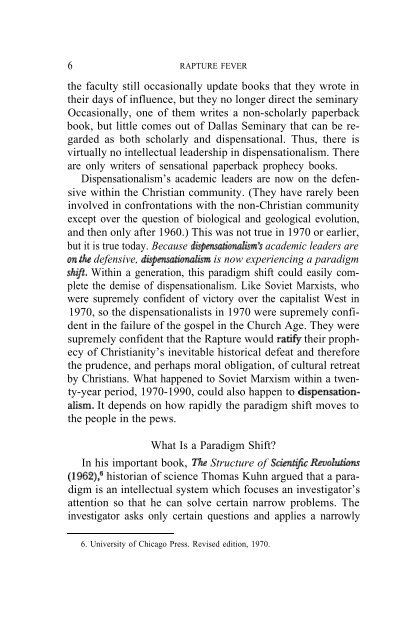- Page 2 and 3: ,. Key Dates in Dispensationalism
- Page 4 and 5: RAPTURE FEVER Why Dispensationalism
- Page 6 and 7: This book is dedicated to Kenneth L
- Page 8 and 9: AT GOD’S RIGHT HAND, UNTIL. . . .
- Page 10 and 11: x RAPTURE FEVER mistake. It is anal
- Page 12 and 13: xii RAPTURE FEVER Gift #1: Our Part
- Page 14 and 15: xiv RAPTURE FEVER heaven, he says t
- Page 16 and 17: xvi RAPTURE FEVER we do not keep Hi
- Page 18 and 19: . . . XVIII RAPTURE FEVER There bat
- Page 20 and 21: xx RAPTURE FEVER He must remain sea
- Page 22 and 23: Foreword xxi And that servant, whic
- Page 24 and 25: Foreword . . . XXIII ried about the
- Page 26 and 27: Preface xxv It is that the children
- Page 28 and 29: Preface xxvii the bureaucratically
- Page 30 and 31: Preface xxix J. Rushdoony intervene
- Page 32 and 33: Preface xxxi biblical languages or
- Page 34 and 35: Preface . . . Xxxlll Biblical Theol
- Page 36 and 37: Preface Xxxv begin to search for a
- Page 38 and 39: INTRODUCTION lb are the salt of the
- Page 40 and 41: Introduction 3 alcoholics and other
- Page 44 and 45: Introduction ‘7 circumscribed sys
- Page 46 and 47: Introduction 9 with taxes extracted
- Page 48 and 49: Introduction . 11 for specific vers
- Page 50 and 51: Introduction 13 ● Are there bibli
- Page 52 and 53: Introduction 15 traditional dispens
- Page 54 and 55: Introdz@ion 17 Christian Reconstruc
- Page 56 and 57: 1 ENDLESS UNFULFILLED PROPHECIES PR
- Page 58 and 59: Endless UnfuljWed Prophecies Produc
- Page 60 and 61: Endless Unfulfilled Prophecies Prod
- Page 62 and 63: Endless Unfulfilled Prophecies Prod
- Page 64 and 65: Endless UnfuljWed Prophecies Produc
- Page 66 and 67: Endless Unfulfilled Prophecies Prod
- Page 68 and 69: Endless Unfu@lled Prophecies Produc
- Page 70 and 71: Endless Unfulfilled Prophecies Prod
- Page 72 and 73: Endless Unfulfilled Prophecies Prod
- Page 74 and 75: Endless Unfulfilled Prophecies Prod
- Page 76 and 77: Endless Unfulfilled Prophecies Prod
- Page 78 and 79: Fear of Men Produces Paralysis 41 b
- Page 80 and 81: Fear of Men Produces Paralysis 43 t
- Page 82 and 83: Fear of Men Produces Paralysis 45 t
- Page 84 and 85: Fear of Men Produces Paralysis 47 b
- Page 86 and 87: Fear of Men Produces Paralysis 49 h
- Page 88 and 89: Fear of Men Produces Paralysis 51 e
- Page 90 and 91: Fear of Men Produces Paralysis 53 m
- Page 92 and 93:
Fear of Men Produces Paralysis 55 W
- Page 94 and 95:
Fear of Men Produces Paralysis 57 e
- Page 96 and 97:
Fear of Men Produces Para@s 59 both
- Page 98 and 99:
3 PESSIMISM PRODUCES PARALYSIS And
- Page 100 and 101:
Pessimism Produces Paralysis 63 “
- Page 102 and 103:
Pessimism Produces Paralysis 65 the
- Page 104 and 105:
Pessimism Produces Paral’sis 67
- Page 106 and 107:
Pessimism Produces Paralysis 69 in
- Page 108 and 109:
Pessimism Produces Paral@s 71 (with
- Page 110 and 111:
Pessimism Produces Paralysis 73 is
- Page 112 and 113:
Pessimism Produces Paralysis 75 Con
- Page 114 and 115:
Dis@nsationalism Removes Earthly Ho
- Page 116 and 117:
Dispensationalism Removes Earthly H
- Page 118 and 119:
Dispensationalism Removes Earthly H
- Page 120 and 121:
D@ensationahsm Removes Earthly Hope
- Page 122 and 123:
Dtifensationaltim Removes Earthly H
- Page 124 and 125:
Dis~ensationali.sm Removes Earthly
- Page 126 and 127:
Dispensationaltim Removes Eatihij H
- Page 128 and 129:
5 A COMMITMENT TO CULTURAL IRRELEVA
- Page 130 and 131:
A Commitment to Cultural Irrelevanc
- Page 132 and 133:
A Commitment to Cultural Irrelevanc
- Page 134 and 135:
A Commitment to Cultural Irrelevanc
- Page 136 and 137:
A Commitment to Cultural Irrelevanc
- Page 138 and 139:
A Commitment to Cultural Imelevance
- Page 140 and 141:
A Commitment to Cultural Irrelevanc
- Page 142 and 143:
A Commitment to Cultural Iwelevance
- Page 144 and 145:
A Commitment to Cultural Irrelevanc
- Page 146 and 147:
A Commitment to Cultural Irrelevanc
- Page 148 and 149:
A Ghetto Eschatology 111 clom is ac
- Page 150 and 151:
A Ghetto Eschatologj 113 testified
- Page 152 and 153:
A Ghetto Eschatology 115 cause of m
- Page 154 and 155:
A Ghetto Eschatology 11’7 actions
- Page 156 and 157:
A Ghetto Eschatology 119 When Chris
- Page 158 and 159:
A Ghetto Eschatology 121 preach God
- Page 160 and 161:
A Ghetto Eschatology 123 antiquaria
- Page 162 and 163:
A Ghetto Eschatolog~ 125 an acciden
- Page 164 and 165:
A Ghtto Eschutology 127 all, the si
- Page 166 and 167:
7 HOUSE OF SEVEN GARBLES [In respon
- Page 168 and 169:
House of Seven Garbles 131 A Fig Tr
- Page 170 and 171:
House of Seven Garbles 133 And let
- Page 172 and 173:
House of Seven Garbles 135 in point
- Page 174 and 175:
House of Seven Garbles 137 As I sai
- Page 176 and 177:
House of Seven Garbles 139 This she
- Page 178 and 179:
House of Seven Garbles 141 legislat
- Page 180 and 181:
House of Seven Garbles 143 the rain
- Page 182 and 183:
8 REVISING DISPENSATIONALISM TO DEA
- Page 184 and 185:
Revising Dhpensationalism to Death
- Page 186 and 187:
Reuising Disfiensationalism to Deat
- Page 188 and 189:
Revising Dtipensationaltim to Death
- Page 190 and 191:
Revising Dispensationali.sm to Dea!
- Page 192 and 193:
Revising Dispen.nationalism to Deat
- Page 194 and 195:
Revising Dispensationaltim to Death
- Page 196 and 197:
Revising Dis@nsationalism to Death
- Page 198 and 199:
Revising D@ensationalkm to Death 16
- Page 200 and 201:
9 DISPENSATIONALISM VS. SIX-DAY CRE
- Page 202 and 203:
Di.spensationalism vs. Six-Day Crea
- Page 204 and 205:
Dispensationalism us. Six-Day Creat
- Page 206 and 207:
Dispensationaltim vs. Six-Day Creat
- Page 208 and 209:
Dispensationalism vs. Six-Day Creat
- Page 210 and 211:
D@ensationalism vs. Sanctification
- Page 212 and 213:
Dispensationalism vs. Sanctificatio
- Page 214 and 215:
Dis$ensationalism vs. Sanctificatio
- Page 216 and 217:
Dispensationali.sm vs. Sancttjicati
- Page 218 and 219:
Theological Schizophrenia 181 again
- Page 220 and 221:
Theological Schiwphrenia 183 1980.
- Page 222 and 223:
Theological Schizophrenia 185 What
- Page 224 and 225:
Theological Schizophrenia 187 nal,
- Page 226 and 227:
When “Babylon” Fell, So Did Dis
- Page 228 and 229:
When “Babylon” Fell, So Did Dis
- Page 230 and 231:
When “Babylon” Fell, So Did Dis
- Page 232 and 233:
13 THE STRANGE DISAPPEARANCE OF DIS
- Page 234 and 235:
The Strange Disappearance of Dispen
- Page 236 and 237:
The Strange Disappearance of D&pens
- Page 238 and 239:
The Strange Disappearance of Dtipen
- Page 240 and 241:
Conclusion 203 supposedly based on
- Page 242 and 243:
Conclusion 205 Fourth, because God
- Page 244 and 245:
Conclusion 207 The dispensationalis
- Page 246 and 247:
Conclusion 209 nobody believes in i
- Page 248 and 249:
Conclusion 211 repeatedly that “p
- Page 250 and 251:
Conclusion 213 original creed again
- Page 252 and 253:
Conclusion 215 struction. Sort of.
- Page 254 and 255:
Conclusion 217 nationalism, openly
- Page 256 and 257:
Conclusion 219 to what you are doin
- Page 258 and 259:
Conclusion 221 surely the situation
- Page 260 and 261:
Bibliography 223 Works Defending Po
- Page 262 and 263:
Bibliography 225 Eschatology. Tyler
- Page 264 and 265:
Bibliograph~ 227 Vos, Geerhardus. R
- Page 266 and 267:
Bibliography 229 thorough critical
- Page 268 and 269:
Bibliography 231 Mauro, Philip. The
- Page 270 and 271:
history and the U.S. Constitution.
- Page 272 and 273:
236 RAPTURE FEVER llO:lf 78-79 Prov
- Page 274 and 275:
abortion, xxxii, XXXV, 13, 141, 160
- Page 276 and 277:
240 RAPTURE FEVER dispensationalism
- Page 278 and 279:
242 RAPTURE FEVER dispensationalism
- Page 280 and 281:
244 RAPTURE FEVER intellectual, xxx
- Page 282 and 283:
246 RAPTURE FEVER Solzhenitsyn, A.,
- Page 284 and 285:
A THREE-YEAR STRATEGY FOR PASTORS I
- Page 286 and 287:
ABOUT THE AUTHOR Gary North receive
- Page 288:
.- -. . . . . 1980 . . -’r -: .,,


















